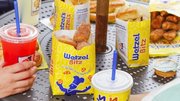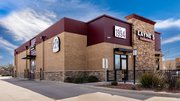Article
Commentary: Time to UNthink 'free'?
A marketing expert weighs in on KFC's missteps with its Oprah-endorsed grilled chicken meal coupon.

May 7, 2009 by Lori Walderich — CMO, Top That! Pizza
What went wrong with KFC's 2-piece grilled chicken promotion? It could have been enough to stick with the one-day one-piece UNFry Day promotion on April 27. KFC spokesman Rick Maynard has said the event to kickoff the new Kentucky Grilled Chicken line was a success, with more than 4 million pieces given away systemwide.
But the following day, 400-plus-unit chain El Pollo Loco countered with a two-piece giveaway with two tortillas and fresh salsa to remind the public of its flame-grilled chicken platform. It may be coincidence that KFC added a two-piece meal giveaway a week later, but the outcome is the same.
Oprah endorsed the 2-piece grilled chicken meal downloadable coupon, which had a two-day download time window and a 14-day redemption window. Consumer frenzy followed, and KFC is still mopping up the mess.
Lori Walderich, principal of IdeaStudio, a specialized chain restaurant marketing and promotion firm, outlines what went wrong with the promotion:
In the world of unintended consequences, KFC takes the prize with its Kentucky Grilled Chicken meal giveaway, unleashed this week with a word from Oprah. To read a KFC spokesperson's follow-up comments, one might infer that the angry consumer reaction was, well … UNthinkable. But was it? Here's what KFC left "UNthought" in developing the promotion:
The instant gratification problem. KFC apparently thought it could average out traffic with a coupon good for two weeks. But "I want it now," is deeply ingrained in human nature. When the word went out to more than 7 million viewers of Oprah, fans practically sprinted to their PCs, immediately overloading both Oprah and KFC Web servers. Then they texted the news to non-Oprah-watching friends and Tweeted it to the rest of the world as they drove to the nearest KFC.
The technology problem. Servers overload. Computers don't all work the same way. Printers print differently from one to another. Coupon seekers reported myriad difficulties in accessing a Web site and printing a coupon. Some had to download special software, cited by one Web professional on a blog as evil "malware." Others got caught in an endless loop as they tried to get to the coupon from Oprah's Web site. Still more were told that they had printed their allotted number of coupons before they had even gotten one to print successfully.
The fraud problem. Print quantities can be "gamed" via PDFs and screen captures. It can be hard to tell the difference between a black and white coupon produced by a printer and one produced by a copier. KFC laid itself open to unlimited fraud by making available a coupon that easily could be mass produced. While some customers reported that they were not allowed to print more than the designated four coupons, others reported printing (or copying) dozens.
Even after the official coupon-printing period had expired, I was easily able to track down a PDF online and print a coupon. Is it valid? I have no idea. There are dozens of conflicting online reports about barcodes, with some sources reporting that there is only one — from the viral PDF I found, perhaps? — and others mentioning coupons with unique bar codes.
I could find no information on the KFC Web site specifying that my coupon must have a unique barcode. All I know is that I have an official-looking printout with a dot-scan barcode (as required in small print) and that my coupon has not been "photocopied, mechanically reproduced or altered" (as forbidden in small print). So why shouldn't it be honored?
The franchisee problem. Overwhelmed by the response to the giveaway, KFC franchisees scrambled to devise a workable plan for their restaurants. Some sought to limit giveaway hours to times when traffic was lower. Some designated a certain number of "promotional" meals and refused to honor coupons after they'd reached that number. Others — either misinformed or prevaricating — said that certain coupon bar codes were invalid (see above), or that coupons not printed in color would not be accepted.
The thing is that none of these caveats appears on the coupon. Most consumers have no clue about how franchising works, and they couldn't care less. They just know that the restaurant they're in has a sign with Colonel Sanders' face on it and that means their coupon should be accepted.
The readership problem. The pieces of chicken to be included in the consumer's free meal were specified in 4-point type as "manager's choice." That didn't prevent irritation among consumers who wanted white meat, but got dark meat instead. Likewise, "while supplies last" was all but unreadable by anyone with less than 20/15 vision.
The entitlement problem. When you tell people they're getting something for free, something strange happens inside their heads. Suddenly, they assume it is owed to them. When they don't get it (especially after having spent literally hours — as some did — trying to print a coupon), they get M-A-D, MAD. It does not matter to them that they're not paying for their meal. They have invested time, excitement and anticipation in a promise from KFC. And they expect a return on that.
The time problem. When hundreds of customers converge on a QSR and demand service, the Q just falls right off, leaving customers to experience long and exasperating wait times. And this isn't just happening to coupon-bearing customers who might be willing to accept a little inconvenience for a free meal. Regular, loyal, paying customers also become the victims of coupon chaos and their relationship with the franchise can be permanently damaged as a result.
The blog problem. As KFC crafted an apology to customers for issues with the promotion — and Oprah's Harpo Productions has yet to even acknowledge them — the ether has been crackling with recriminations from thousands of commentators who have nothing good to say about either sponsor. Instead of praise, bloggers were posting about unhappy personal experiences touching on every aspect of the giveaway and about angry throngs of disappointed customers at KFC locations. As a National Public Radio commentator dryly observed, you do not want "to spend the day after what should have been your moment of triumph clarifying that 'there was no riot.'"
The apology
Working harder than he should've to sound happier than he ought to have been at finding himself in the midst of a PR debacle, KFC president Roger Eaton appeared yesterday in a video posted to YouTube and announced that the company was suspending its free meal coupon offer.
To quote the great Claude Raines, "I'm shocked. Shocked!"
With painfully forced enthusiasm, Eaton describes the "overwhelming response" and enthuses that "Clearly, America loves the great taste of Kentucky Grilled Chicken." Well, no, that's not clear at all. It's clear that America loves free stuff, but how could they know they love the taste of KGC if they couldn't redeem their coupons?
Eaton cheerfully goes on to explain that the unexpected response has forced the company to implement a new rain check procedure by which customers can request a replacement coupon in the mail. And once again, the company bungles its communication.
"Please bring your coupon to a KFC restaurant or visit KFC.com and in exchange we'll send you a rain check for another time," Eaton promises.
The implication is that one may apply for a raincheck on the Web. Ix-nay on the Eb-way. The site directs visitors to take their coupon to KFC. So a trip to the store is mandatory. The bloggers are already grousing.
Additionally, Eaton consistently refers to "coupon" and "meal" in the singular case, though the original promotion offered four free meal coupons per person. So, can I send four coupons? If I do, will I receive four coupons or just one? Is KFC just addicted to cliffhanger endings, or did they not anticipate this question?
One would hope that KFC might take away a few lessons from this week's free meal fiasco. Nope, apparently not. With its latest communication, the company now ensures that the bad taste its Kentucky Grilled Chicken promotion has left in consumers' mouths will linger for quite some time to come.
It seems obvious that KFC failed to give any critical thought to the particular difficulties that the company and their franchisees might encounter in the execution of this promotion. The resulting damage to their brand caused by this thoughtlessness will not soon be repaired. As it turns out, the domain name of the franchise's micro site, unthinkkfc.com, may be the only be part of this campaign that makes sense to customers.
Walderich also is moderator of theThought for Food Blog. More information about IdeaStudio can be found atideastudio.com.









